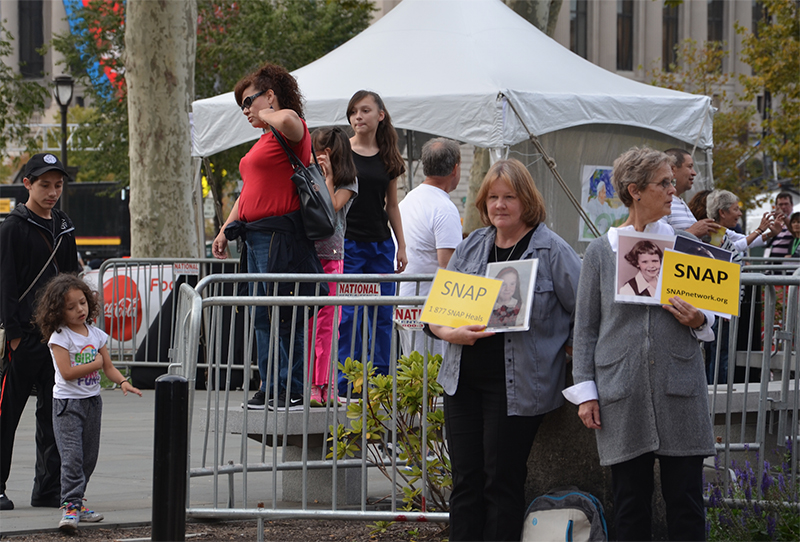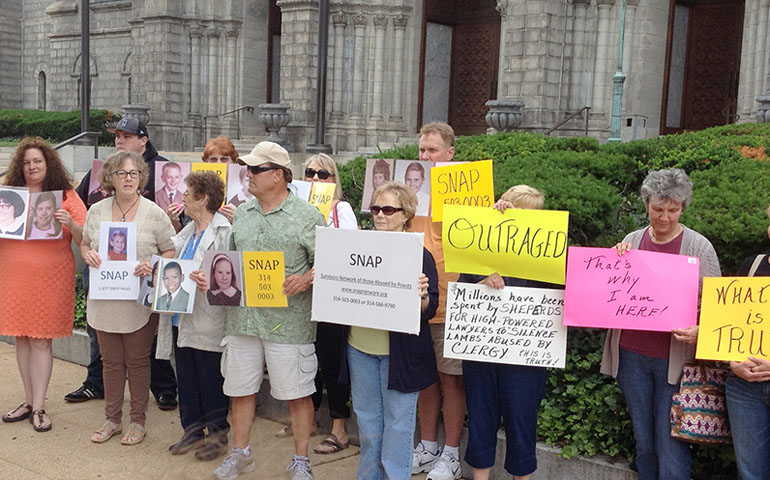
Becky Ianni, left, and Barbara Dorris, in a 2015 file photo, outside the Cathedral of Sts. Peter and Paul in Philadelphia where they shared stories of sexual abuse by priests (RNS/Taylor Nakagawa)
SNAP, the organization that has become synonymous with uncovering the clergy sex abuse scandal, may be outpacing its acronym.
The Survivors Network of those Abused by Priests, established in 1988, has been at the forefront of advocating for victims of clergy abuse and at pressing for accountability by church leadership. However, it was evident at a gathering of 300 victims, advocates and supporters Aug. 11-13 in Alexandria, Virginia, that the organization is in the midst of change.
"We're in transition," said Barbara Dorris, who took over as president when the group was left leaderless when founder Barbara Blaine and longtime national director David Clohessy, resigned within weeks of each other. Both longtime leaders said their resignations had been in the works for months and were not connected to a lawsuit filed in January in which both were named.
“We’ve gone from founder-led into an organization that is going to work more trying to build partnerships with other organizations, to build a stronger voice to protect children and do more outreach,” said Dorris. She also expressed a willingness to discuss a suggestion advanced by an expert that SNAP do more to connect victims with professional counselors.
The outreach is evidently underway. Dorris said this year’s conference included representatives of a number of other denominations as well as organizations such as the Boy Scouts.
“So, where we were focused on Catholics, we feel we’ll be stronger and have a better chance of accomplishing our goals if we become more inclusive,” she said.
If there is a natural expansion to the project — Joelle Casteix, a western regional leader for SNAP, reports that the vast majority of calls she now receives are not related to church abuse — the Catholic Church remains a central component of the group’s work. Survivors of abuse by priests are still predominant in its membership, the preponderant conversation is about elements of the church scandal and the new areas of the globe where reports of priest abuse are now beginning to surface.
Dominican Fr. Thomas Doyle and former Benedictine priest Richard Sipe both took the main stage at different times to recount their personal history in the struggle and to exhort survivors to work together in support of each other and the pursuit of justice.
The back page of the conference program was further evidence that the Catholic piece of the problem is still prominent. Bishopaccountability.org, an extensive digital repository of information and data about the scandal, lists 59 new names of those considered credibly accused that made it into the organization’s database in the past year. The database, which contains voluminous documentation, including legal transcripts and depositions as well as correspondence, currently lists as credibly accused of sexual abuse 27 bishops, 3,774 priests, 59 deacons, 23 seminarians, 290 brothers and 95 women religious. Not included, according to those managing the website, are 2,645 priests counted as credibly accused by the United States Conference of Catholic Bishops but not yet identified.

Catholics and sexual abuse survivors protest in front of the Cathedral Basilica of St. Louis, in a 2014 file photo. (RNS/Courtesy Barb Dorris/SNAP)
Dorris, herself a survivor who was repeatedly molested and raped as a child by a parish priest, said she welcomes the opportunity to explore suggestions advanced by Mary Gail Frawley-O'Dea in one installment of a series published in NCR last June.
O'Dea, an author and psychologist who has worked with sexual abuse survivors for more than 30 years, wrote, "Is it time, however, to ask if SNAP can grow beyond its work of confrontation? Twenty-seven years is a long time to be battling such a formidable institution as the Catholic Church. To do so has required a herculean degree of dedication, as well as a high level of agreement about what needs to be done."
Such a concentrated focus on advocacy, she wrote, left little time for healing.
"SNAP has never taken an organized approach to that part of the process," wrote O'Dea. "For example, SNAP is ideally situated to develop a sister organization, one headed by researchers, academics, clinicians and victims, completely dedicated to addressing the healing needs of survivors and separate from advocacy activities."
Advertisement
SNAP at times "became overwhelmed with so much happening so fast, we couldn't sort fast enough because there was so much going on," said Dorris, who also praised the work done previously by Clohessy and Blaine. "I think that things have slowed down, and it's time to re-evaluate what's been done and what we should be doing."
Dorris said she has spoken with O'Dea and intended to pursue her ideas more following the conference.
"I think there's something to be learned from her," she said. "I think she's got information we need, and I think we can have a discussion."
Casteix, who has long worked as a volunteer on the West Coast, agreed, saying she thinks the future of SNAP is as "a broader, board-run" and more nimble organization with a larger funding base and in partnership with individuals like O'Dea and other organizations that have an interest in dealing with the problem of abuse.
Those discussions and other considerations of organizational change continue to occur under the shadow of a lawsuit filed in January in Illinois by former SNAP employee Gretchen Rachel Hammond claiming that the organization "does not focus on protecting or helping survivors — it exploits them." It further alleges that SNAP "routinely accepts financial kickbacks from attorneys in the form of 'donations.' " SNAP, which has historically acknowledged donations from attorneys, has adamantly denied any kickback scheme and said there is no law preventing the organization from accepting attorney donations.
Dorris said long-range planning is on hold until the suit is settled, but it is also unrealistic to "have your sole employee be 70 years old," she added, referring to herself.
Meanwhile, the day-to-day work presses on and includes an expanding territory. SNAP now hears regularly, Dorris said, from Malaysia, South America, the Philippines and India. Most of the cases are Catholic Church related, and the major challenge is to devise strategies that work in different cultures.
[Tom Roberts is NCR editor at large. His email address is troberts@ncronline.org.]





